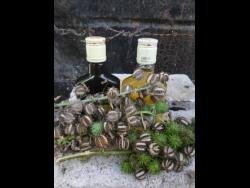The Struggles of Jamaica’s Castor Oil Industry: A Hidden Gem in a Sea of Counterfeits
The Jamaican castor oil industry, often seen as a small-scale venture, is grappling with a significant challenge: the overwhelming presence of counterfeit products that tarnish its reputation. Local producers of Jamaican Black Castor Oil (JBCO) are raising alarms about fake oils flooding the market, primarily from India and China, which are falsely labeled as Jamaican and sold at a fraction of the price.
A Market in Distress
According to the Mona Institute of Applied Sciences (MIAS), the global market for JBCO is valued at a whopping US$300 million, yet Jamaica’s share is a mere $5 million. Dr. Howard Reid, the principal investigator at MIAS, emphasizes that the lack of global standards for JBCO has left Jamaican producers vulnerable. “Jamaica has not told the world what JBCO is, and JBCO is not protected globally,” he stated, highlighting a critical gap that needs to be addressed.
The Cost of Authenticity
The stark difference in production costs is a significant hurdle for local producers. While a metric tonne of commercial-grade castor oil from India or China costs around US$1,800, authentic JBCO can enter the export market at about US$18,000 per tonne. Courtney Haughton, president of the Jamaica Castor Industry Association, explains, “Our scale is so small, our production cost is very high, which means our end product goes into the market significantly more expensive than the fake products.”
The Role of Education
Jeremy Dixon, founder of the Jamaica Black Castor Oil Company, believes consumer education is vital. “There are opportunities in the sector, but you’re competing with a lot of fakes on the market,” he said. The traditional method of producing JBCO involves roasting and boiling castor beans, giving it a unique smoky aroma. In contrast, counterfeit oils are often cold-pressed and artificially colored to mimic the authentic product.
Government Support and Future Prospects
Despite the challenges, there is hope for the industry. Last year, former Minister of Agriculture Pearnel Charles Jr. noted that the castor oil sector could significantly boost Jamaica’s economy if local production improves. However, Haughton feels that the Ministry of Agriculture isn’t providing enough support. “With someone like that in every RADA location, we could grow this industry,” he suggested, referring to the Rural Agricultural Development Agency’s efforts in Manchester.
The Path to Protection
MIAS is spearheading a project aimed at establishing standards and protecting JBCO’s intellectual property. The first phase, completed in December 2024, focused on the physical and chemical standards for Jamaican castor plants. The next phases will involve securing geographical indications (GI) for JBCO, which would prevent non-Jamaican producers from mislabeling their products.
A Growing Demand
Despite the challenges, there’s a growing demand for authentic JBCO. Yunique Francis Myers, co-owner of Castor Care Jamaica, shares her excitement about the product’s popularity. “People are loving not just castor oil, but Jamaican black castor oil,” she said, noting that her brand thrives on word-of-mouth and social media.
As the industry navigates these turbulent waters, the question remains: can Jamaica reclaim its rightful place in the global castor oil market? With the right support and consumer awareness, the potential is there, waiting to be unlocked.

